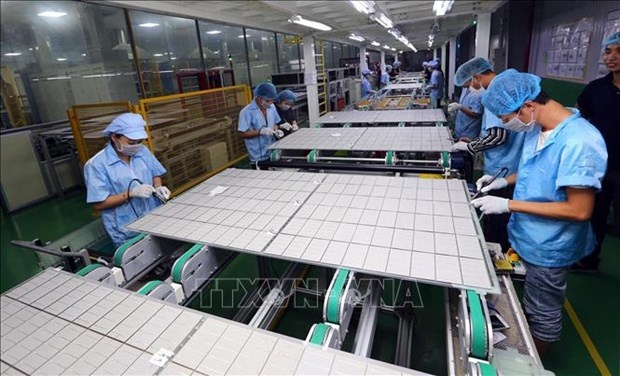INTERNATIONAL INVESTMENT
AND PORTAL
Low labour cost, favourable geographic location and the expansion of investment abroad are three key factors helping Vietnam secure its foreign direct investment (FDI) attraction, according to Chief economist VinaCapital Michael Kokalari.
 Illustrative image (Source: VNA)
Illustrative image (Source: VNA)
Hanoi – Low labour cost, favourable geographic location and the expansion of investment abroad are three key factors helping Vietnam secure its foreign direct investment (FDI) attraction, according to Chief economist VinaCapital Michael Kokalari.
The official explained that factory wages in Vietnam are about two-thirds below those in China, but the quality of the workforce is comparable.
Secondly, Vietnam has close geographic proximity to Asia’s supply chains – especially in the high tech industry. Also, Japan and the Republic of Korea (RoK) face structural issues that compel both countries to invest abroad – and Vietnam is the most attractive destination in the region.
Further to that point, the two countries are currently burdened by “secular stagnation”, which is primarily caused by poor/declining demographics, and other factors, including heavy debt. Japan’s demographics started seriously deteriorating around 1990, and the Japanese responded to the country’s deteriorating economic prospects at that time by aggressively investing in Southeast Asia, the official added.
The RoK’s demographics are even worse, ensuring that investment from there will also continue to flow into Vietnam for years to come.
In addition to the three factors highlighted above, an increasing number of multinational corporations are seeking to diversify their manufacturing outside China.
While all of the factors above help explain why FDI inflows into Vietnam have remained resilient over the last two years, the same factors will also help propel those in 2022. That said, there were three developments in 2021 that will also help support inflows next year.
Firstly, the US Treasury Department and the State Bank of Vietnam reached an agreement in July that essentially removes the risk of Vietnam being labelled a currency manipulator in the future, which will give multinational companies more confidence to invest in Vietnam.
Next, the impressive speed of Vietnam’s vaccination campaign once the Delta variant emerged gives foreign companies confidence that the government is committed to achieving a prudent balance between public health and economic health concerns in the “living with COVID-19” strategy.
Finally, the most recent development that should encourage future FDI inflows to Vietnam was the announcement that Denmark’s LEGO will invest 1 billion USD to build one of its biggest factories in southern Vietnam, Kokalari concluded.
VNA



















